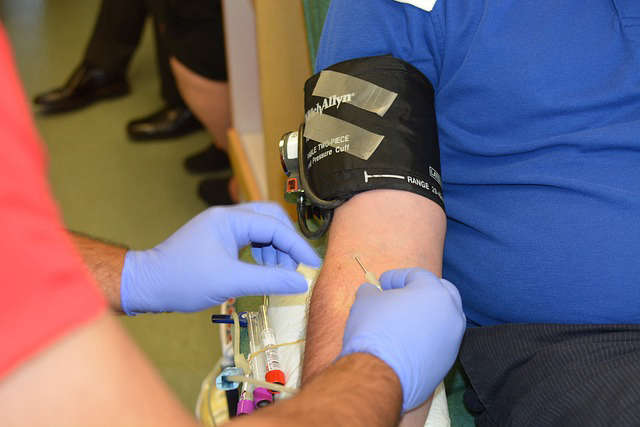
One would think that the process to diagnose a person with Lyme Disease would be simple, but it was anything but for a resident of Ingersoll.
OXFORD COUNTY - Fatigue, dizziness, blood in urine, night sweats and more; these are all symptoms of Lyme Disease.
After getting bit by a tick in the Dominican back in 2015, Ingersoll resident Yolanda San says her battle with the disease was anything but easy, but she says there is hope.
"People need to know that there are people out there like naturopaths that can direct people in the right direction."
In 1995, there were 917 cases of Lyme Disease in Canada, San didn't become one of the statistics simply because she fell short of receiving an official diagnosis in Canada. Without the diagnosis, she could not receive treatment in the Candian health care system, making the journey for San a hard one, physically, emotionally and financially.
San took matters into her own hands and got a $100,000 line of credit, jumped on a plane and headed to Florida. There, she stayed for three months at a private clinic for treatment in an effort to be rid of the disease. Upon returning home, she also sought out a herbalist in London Ontario who was instrumental in ridding the bacteria from her body.
Heart Fm News spoke with Dr.Joyce Lock, the Medical Officer of Health with the Southwestern Health Unit about the flaws in the Canadian Health Care system's diagnosis protocol for the disease.
"I would concur that our tests have some flaws, but I think considering what is out there at the moment, we are doing the best that we can do, and I also think that ongoing research is required to find better testing."
The main issue in San's case was that she was not bit by a dear tick, so as one of the early diagnosis criteria, it was dismissed for possible Lyme. Dr.Lock says there are several stages in the diagnosis process. The first is simply a conversation for screening.
"Symptoms can come as early as three days to a month after getting a tick bite. The health care practitioner will talk to the patient to find out where they were when the bite took place, and determine if it is an area where ticks may be present that have been infected with the bacteria causing Lyme."
Dr.Lock adds that people should take precautionary measures in areas that have been deemed high risk areas with ticks containing the troubling bacteria, but there is one key element to actually becoming infected.
"The tick actually has to attach itself to a person for more than 36 hours for the bacteria to be transmitted. So it is a clinical diagnosis. The patient will at some point get what is called early Disseminated Disease, which will come about three months later, and present in either cardiac symptoms or neurological symptoms, it is at this time that a blood test would be given."
Many may wonder why a blood test isn't administered immediately. There is a reason for that says Dr.Lock.
"We don't do a blood test early on just after a bite, because what the blood test measures is an antibody that you form against the bacteria that transmits the Lyme and it takes the body a while to form the antibody."
Health Canada is well aware of cases such as San's and Dr.Lock says they are trying to prevent this from happening to others.
"Last year the Chief Medical Officer of Heath Canada, Dr.Theresa Tam, came up with a strategy to address Lyme Disease in Canada and she acknowledged that she has heard these types of stories and is aware that people have suffered with it . So we are sensitive to this and to that degree, the federal government has a three-pronged strategy to improve our management and diagnosis, which has also been picked up by the province."
For Yolanda San from Ingersoll, she is simply happy to have her life back. To be told she was Lyme Disease free was an emotional moment.
"I got told on July 28th, 2017 and I cried and cried. I just want people to know that if they do have this disease they are not alone, and that they can get cured from this and have their life back. There are people who can help, even if the government won't."
For more information on the initiatives in place by the Government of Canada click here.



 False 9-1-1 Calls Hit Norfolk County
False 9-1-1 Calls Hit Norfolk County
 Woodstock Choralaires Hosting 70s Themed Show
Woodstock Choralaires Hosting 70s Themed Show
 Thamesford Tim Hortons Accepting Smile Cookie Preorders
Thamesford Tim Hortons Accepting Smile Cookie Preorders
 Three Vehicle Crash Investigation in Brant
Three Vehicle Crash Investigation in Brant
 News Poll: Blood Donation
News Poll: Blood Donation
 WCI Red Players Present: Concert for the Cure 2024
WCI Red Players Present: Concert for the Cure 2024
 Oxford Resident Charged with Shoplifting
Oxford Resident Charged with Shoplifting
 Earth Day is Celebrated in Woodstock
Earth Day is Celebrated in Woodstock
 One Man Charged after Fraudulent Activity
One Man Charged after Fraudulent Activity
 Norfolk OPP Catch Impaired Driver
Norfolk OPP Catch Impaired Driver
 Woodstock Navy Club Welcomes Universal Washroom
Woodstock Navy Club Welcomes Universal Washroom
 Oxford County Waste Survey Closing Soon
Oxford County Waste Survey Closing Soon
 Woodstock Receives Award for Lifesaving Program
Woodstock Receives Award for Lifesaving Program
 OPP Investigating Door-to-Door Sales
OPP Investigating Door-to-Door Sales
 Stolen Car Spotted in Waterloo Region
Stolen Car Spotted in Waterloo Region
 Woodstock Receives Fourth-Quarter Payment from OLG
Woodstock Receives Fourth-Quarter Payment from OLG
 Oxford Attack U-19 Boys Vying for Spot in OBXL
Oxford Attack U-19 Boys Vying for Spot in OBXL
 Voting Open for Oxford Reads 2024
Voting Open for Oxford Reads 2024
 South Gate Expansion Expected to Begin this Summer
South Gate Expansion Expected to Begin this Summer
 Battle of the Badges this Sunday
Battle of the Badges this Sunday



Comments
Add a comment